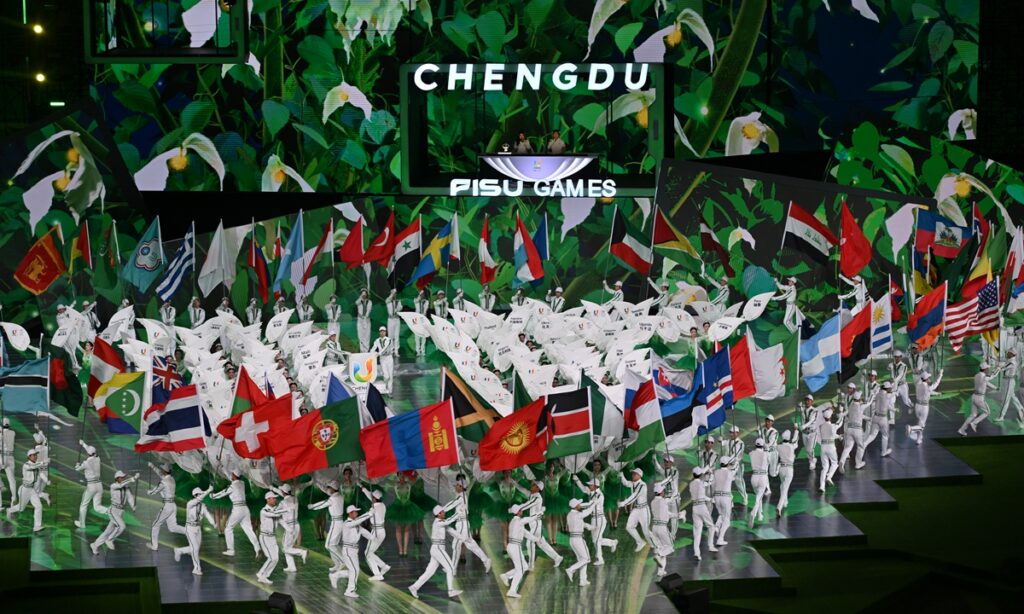Chengdu showcases openness, inclusiveness and vitality of China today
The 31st FISU World University Games, after offering exciting competitions and diverse cultural exposure, concluded on Tuesday in Southwest China’s Chengdu with a splendid ceremony that wrapped up shining moments during the Games and delivered wishes for a happier and brighter future.
The Chengdu FISU Games were not only a gathering for sports, but also a gathering to enhance mutual understanding and make friends, and the friendship will pass on among youth from all over the world with their traits of openness, inclusiveness, solidarity and vitality, analysts said.
The appearance of delegations features the process of a dove tree’s growing from root to giant plant with lush branches and leaves. The dove-like flowers, a symbol of peace, then start to bloom.
The dove tree is a species indigenous to China which survived the ice age and its flower resembles a flying dove with two snow-white bracts. The ceremony incorporates the elements of the dove tree and its flowers to stress the resilience of life and the hope for everlasting peace.
Chinese State Councilor Shen Yiqin and FISU acting president Leonz Eder attended the ceremony.
The ceremony stage was designed based on a “cell phone” and captured the concept of livestreaming. Through the camera of a “livestreamer,” young people from all over the world were able to be part of the FISU Games.
The master display presented 3D visual effects with naked-eye 3D technology, offering novel, amazing, special and delicate spectating experience.
After lowering the FISU flag along the playing of the FISU anthem, the flag was handed over to Rhine-Ruhr, host city of next FISU Games in 2025.
The FISU Games ran from July 28 to August 8 and featured 269 events across 18 sports. The Chinese delegation participated in all 18 sports of the games and claimed 103 gold medals, 40 silvers and 35 bronzes in total, ranking on top of the medal tally.
Besides performance on the competition ground, China’s performance in terms of hosting this international event is also well recognized.
“The preparations and setup of the venues are just unbelievable. Everything has been running smoothly and the competitions are going very well. We can only praise the organizing committee for the great work it’s done,” Eder said in an earlier exclusive interview with the Global Times.
Making friends
For the participants, from athletes and coaches to staff and volunteers, the past weeks have made Chengdu, known for its tasty cuisines, adorable pandas and a leisure lifestyle, an unforgettable place where they’ve shed sweat and tears, challenged themselves and make breakthroughs, and more importantly, make friends beyond borders, analysts said.
One touching moment which can elucidate the sportsmanship of the youth event happened on Friday. When Uganda’s badminton player Amos Muyanja broke his racket without a replacement, his competitor from China Wang Zhengxing offered Muyanja a backup racket.
The FISU Games organizer wrote on Twitter that “we unite to push our limits and inspire each other… We wish all the participants not only to take home victories but also friendship and cherished memories!”
Azerbaijan badminton player Agil Gabilov told the Global Times on Tuesday that Chengdu has been a great experience for him. He made friends with athletes and volunteers and was impressed by the friendliness he received.
Brazilian swimmer Fernanda Gomes Celidonio said that volunteers at the Chengdu Games made her feel “at home.”
Athletes including German volleyball player Yann Bohme got a birthday surprise as after a match, the cheering squad and mascot Rongbao wished him happy birthday and the audience sang in chorus the birthday melody for him.
Athletes also received special gifts, including 3D-printed figurine and local artifacts such as palm fiber weavings and embroidery badges, according to media reports.
The Games also provide a great platform for cultural exchanges other than competition, which Zambian tennis player Esther Sakala appreciated a lot.
Sakala, as a lover of art and an artist herself, was excited to meet those crafty and talented people and see their skills. She had a chance to paint a cup which was later given as a gift and Sakala said she “Loved it so much.”A range of Chinese cultural elements, from handicrafts to musical instruments, have intrigued FISU Game participants at a culture fair held next to the Games Village.
Youth spirit
On and off the competition ground, youth across the world are demonstrating the spirit of openness, inclusiveness and solidarity, igniting a world of division and turbulence, analysts noted.
The Chengdu FISU Games were postponed twice due to the COVID-19 pandemic, and this successful holding marked the resumption of face-to-face communication and exchanges among youth via sports and can leverage more interactions in other fields, such as culture, they said.
Li Haidong, a professor with the China Foreign Affairs University, told the Global Times on Tuesday that sport can be an easy bridge to connect people from different countries and regions and help them build friendship.
The FISU World University Games in Chengdu are a precious opportunity for athletes and people from all around the world to deepen mutual understanding and trust, which will also lay the foundation for closer cooperation and solidarity, Li noted.
FISU Universiade was first held during the Cold War in 1959. It not only encourages young people to adopt a healthy lifestyle, but also seeks to promote young people communicating across cultural, political and religious barriers through sports, Ren Hai, a professor at the Olympic Research Center of Beijing Sports University, told the Global Times.
When the world is experiencing uncertainty and turbulence, China hopes to deliver a message of peace, communication and cooperation through this gathering of young people, who represent hope and the future, analysts said.
Eder, the acting president of the FISU, has visited China more than 20 times and observed the country’s fast economic development, as well as its increased confidence and openness. “I can feel the country’s readiness to cooperate with many countries whether they come from the East, West, North, or South,” Eder said.
(Global Times)




